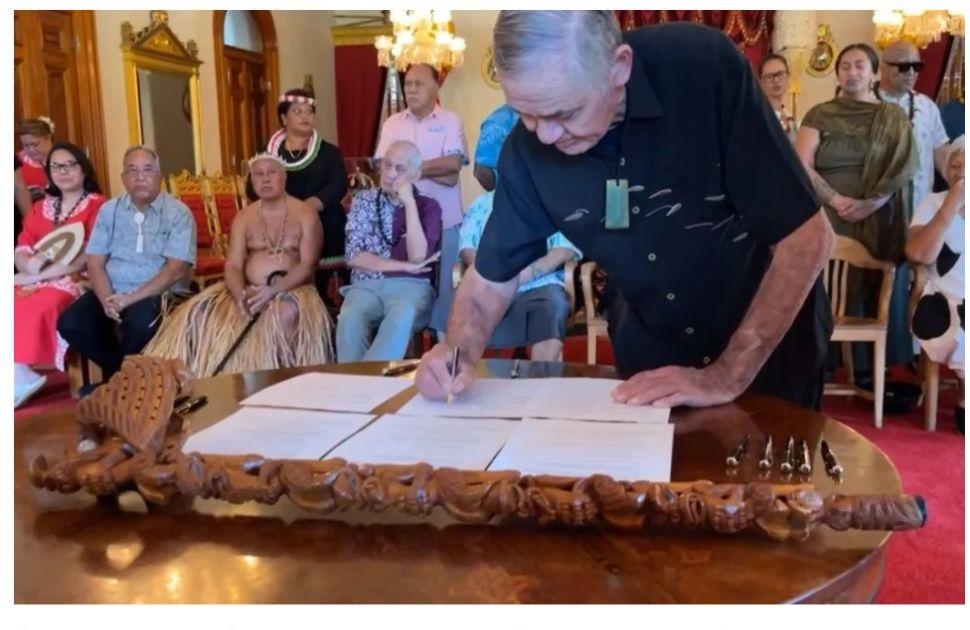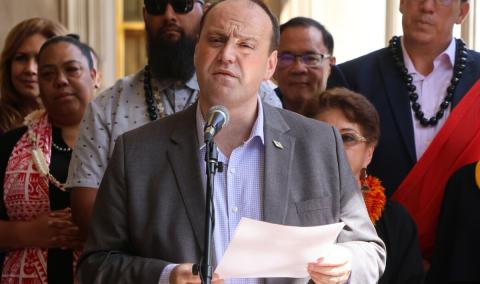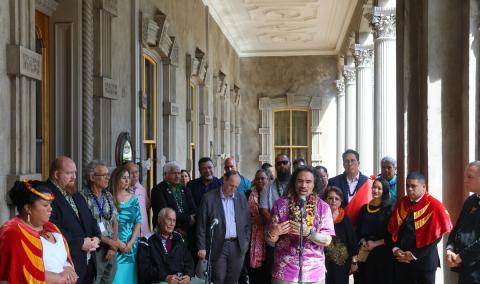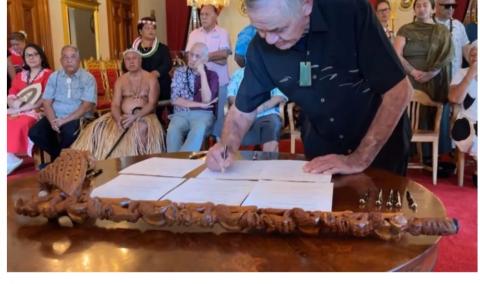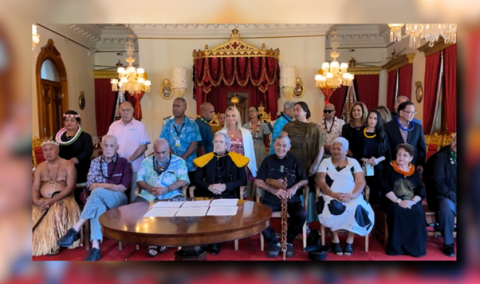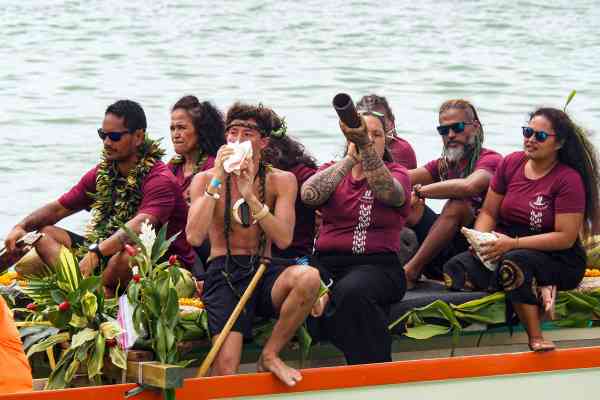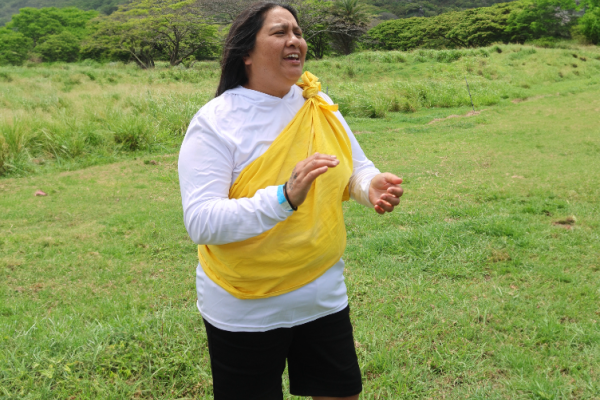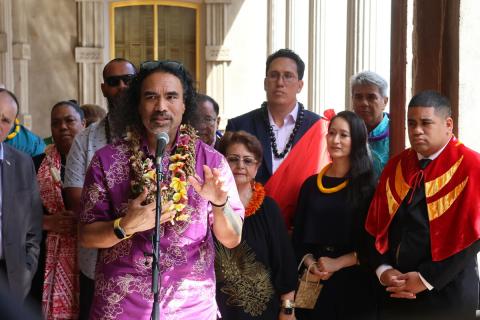
In the spirit of King David Kalākaua of Hawai’i, known for establishing diplomatic ties with Pacific monarchs during his reign, a historic meeting of traditional leaders marked an important moment at the 13th Festival of Pacific Arts and Culture (FestPAC13) with the signing of the Tuurama Ariki Declaration on 13 June 2024 at the Iolani Palace.
The declaration solidifies traditional leaders' commitment to strengthen relationships with each other across the Pacific region and share knowledge to collectively address challenges confronting Pacific people.
The Tuurama Ariki Declaration, with "Tuurama" symbolising ancestral wisdom guiding the journey ahead, saw leaders pledging to utilise Indigenous traditional knowledge to lead their communities forward.
Key traditional leaders present at the signing of the declaration included: His Royal Highness Prince David Kaumūali’i Kawānanakoa of Hawai’i, His Majesty Kiingi Tūheitia Potatau Te Wherowhero VII, Te Kiingi Maori represented by the Kingitanga Chief of Staff Ngira Simmonds, Ratu Epensia Cakobau, Turaga Bale Na Vunivalu of Fiji, Iroij Lanny Kabua, Chairman of Iroij from the Republic of Marshall Islands, Popuwisum Peter Aten, Chairman, Council of Paramount Chiefs, Islands of Chuuk of the Federated States of Micronesia, Carmen Hulu Lindsey, Chairman, Board of Trustees, Office of Hawai’ian Affairs, Hawai’i and Jarrett Keohokalole, Senator, State of Hawai’i.
Major priorities for Pacific traditional leaders have been to strengthen regional unity and cooperation, and to address shared challenges such as climate change and sustainable development.
Through the declaration, traditional leaders have reaffirmed their commitment to regional unity, solidarity, and cooperation, embodying the Pacific way and reminding us that we are one people, connected by the ocean, cultures, and the mana of Pasifika.
Mr. Emile Kairua, Chair of the Council of Pacific Arts and Culture from Cook Islands, shared, "What happened here is incredibly significant, not just for Hawai’i but for all of us. In the Cook Islands, we are fortunate to have our sovereignty. We have a unique relationship with New Zealand, a choice we made ourselves. We are perhaps the only country in the world that has achieved independence while maintaining an association with a former colony.”
“This relationship is ideal; we are connected to a larger entity, but we retain control over our own destiny. We wish the same for Hawai’i and all the other countries of the Pacific: that the world recognises us as sovereign nations. It doesn't diminish the influence of those who seek to control us; rather, it empowers us to make our own decisions and govern our own futures."
The Kiingitanga's chief of staff, Ngira Simmonds, said the declaration formalises relationships between traditional leaders across the region.
"We firmly believe that traditional leaders have a distinctive focus, one that is more long-term and centred on different issues. We want to celebrate that and connect them across the ocean."
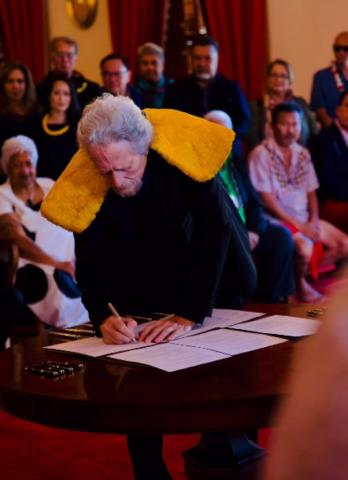
The declaration is a culmination of years of effort and signifies a major milestone for Kiingi Tuheitia, the Maori King of New Zealand. Simmonds emphasised the importance of this step, reflecting on the King's ongoing journey towards Kotahitanga, or unity, for his people.
"This year, the King has been on a journey of Kotahitanga, exploring how we can unify our people, and that's incredibly important for us. What took place today is the next step in that journey," Simmonds said. "It all relates back to what we're doing in our home, what you're doing at your home, and what our brothers and sisters across the Pacific are doing in their homes."
This new declaration not only formalises relationships but also sets the stage for a future where traditional leaders can collaborate more effectively, sharing their wisdom and strategies for the betterment of their communities. It marks a significant stride towards unity and collective progress across the Pacific.
Aotearoa New Zealand has offered to lead the way forward and plan further events in this regard.
This historic moment at FestPAC13 was a continuation of efforts initiated in February 2024, when on the invitation of Fiji’s Turaga na Vunivalu na Tui Kaba, invited several traditional leaders to reflect on what an ongoing engagement might look like.
Key figures, including Fiji’s Turaga na Vunivalu, na Tui Kaba, Ratu Epenisa Cakobau, Māori Kīngi Tūheitia Potatau TeWherowhero VII, Māori Princess Te Puhi Ariki Ngā Wai Hono i te Pō, Samoa’s Tui Ātua Tupua Tamasese Tupuola Tufuga Efi, and representatives of Hawai’i’s Prince David Kaumūali’i Kawānanakoa, had gathered and revived a tradition dormant for forty years since the last meeting of Pacific traditional leaders in 1984. Leaders from Tonga, Fiji, Samoa, and New Zealand had previously convened to address regional issues, resulting in the Polynesia Heritage Trust Act of 1984.
The February 2024 talanoa sessions provided a platform for leaders to discuss decolonisation, climate change, and cultural identity. Whilst in Fiji, the leaders also made an appearance at Fiji’s Great Council of Chiefs meeting, which had reconvened after a 16-year hiatus.
